Game Of Thrones Season 1: The Unexpectedly Pivotal Moments
Rewatching Game Of Thrones season 1 now gives us some interesting ironies and foreshadowing. Major spoilers ahead…
This article comes from Den of Geek UK.
Seasons 1-7 spoilers ahead.
In Daenerys Targaryen’s first appearance on Game Of Thrones, she’s stripped naked (by no means an uncommon occurrence in the early seasons) while her handmaidens draw her a hot bath. What happens next makes her servants gasp in shock. No, not Dany’s worm of a brother sexually molesting her—that’s basically a Tuesday in the Seven Kingdoms—but Dany walking into water that’s almost boiling and not being burned.
It’s a fleeting moment that falls straight from your mind the first time around, pushed out by the much more curious sight of Tyrion Lannister having the exact same hair color and cut as Shirley from EastEnders, or the grievous national fabric shortage causing all those bosoms to go tragically uncovered.
Knowing what we know now—that Daenerys Stormborn is the Unburnt, Queen of the Andals and the First Men, Khaleesi of da dum da dum di dum di of Dragons—the hot bath takes on significance. It foreshadows Dany’s final scene of the season, in which she walks into the flames of a funeral pyre and emerges unburned, undressed and with only a baby dragon for modesty, held artfully in front of her great grass sea.
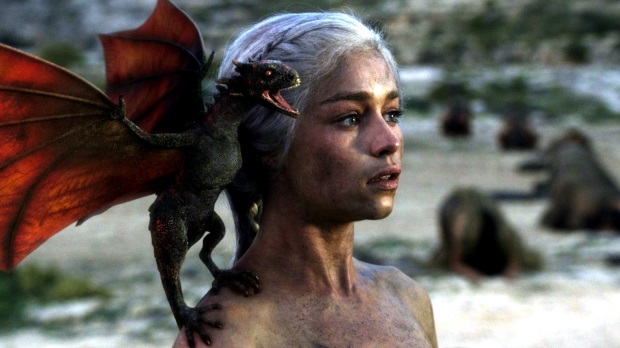
Hindsight makes clairvoyants of us all. Meeting little Rickon Stark at an archery session in the knowledge that five seasons later, he’ll provide the target practice, is ominous but only inadvertently so. Other instances (“I have known Lord Walder since I was a girl,” says Catelyn Stark, “He will never harm me!”) are much more deliberately designed. Several languages are spoken in Game Of Thrones season one, but none so frequently as irony.
It becomes satisfyingly ironic, for instance, when Littlefinger plays the Shakespearean villain early on, muttering in soliloquy “Ah, the Starks – quick tempers, slow minds.” Lord Baelish underestimating the speed of a Stark mind is exactly what does for him years later. His retort to the old saying ‘what you don’t know won’t hurt you’ simply proves very true. “What we don’t know is usually what gets us killed,” says Littlefinger.
What literally got Littlefinger killed of course, was the dagger with which he tried to frame Tyrion Lannister for the attempt on Bran Stark’s life in season one. After the pivotal reappearance of that in the show’s penultimate run, its every appearance alongside Aidan Gillen’s character in season one comes with an added shiver.
What really blows your dramatic irony gaskets, though, is viewing the first season in the knowledge that Jon Snow, Lord Eddard Stark’s bastard, is no such thing. Every third word addressed to Jon Snow in season one is “bastard.” Whenever you see him wince at being called an illegitimate son-of-a-whore, you want to reach into the screen and pat his fluffy cloak reassuringly. “There, there Jon Snow. You’re not really a bastard. You’re actually heir to the Iron Throne. And I wouldn’t sweat all this virgin business either. You boy, are about to get some serious ass.”
(I wouldn’t tell him about getting stuck with more knives than the Pop-Up Pirate by the Night’s Watch in season five though. He’d only worry.)
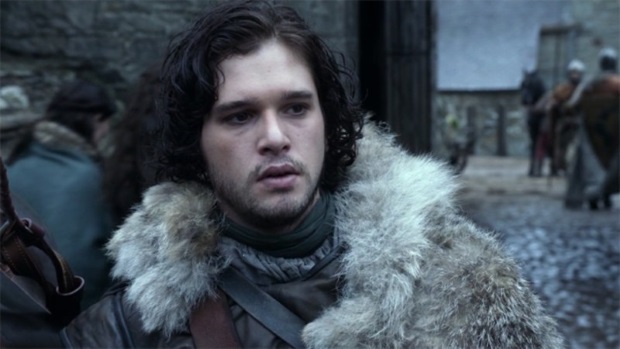
The real highlight of the ‘Jon’s not a bastard’ dramatic irony is Ned Stark’s farewell to his nephew as he sets off for Castle Black. “There is great honor serving in the Night’s Watch,” Ned tells Jon. “The Starks have manned the Wall for thousands of years. And you are a Stark. You might not have my name, but you have my blood.” Cleverly said, Ned. That’s honorable Eddard Stark for you – the man would sooner plait Lancel Lannister’s golden hair than tell a lie.
A rewatch exposes the pivotal lies told in season one. The ten-year-old boy slurping noisily from Lysa Arryn’s nipple should have alerted us to the fact that she was unlikely to be a reliable source of information. Yet, when she accused the Lannisters of having poisoned her husband, we fell for it. Lysa’s letter falsely pointing the finger at the royal family is received, read, and burned by sister Catelyn in under a minute of screen-time. Its lies though (Lysa murdered her hubby at the behest of Littlefinger) prove more destructive than a bathtub of wildfire.
Speaking of burning to a painful death, season one’s writers appeared to have fun at one character’s expense in particular. Weaselly tyrant Viserys Targaryen’s chief ironic moment may have been the golden ‘crown’ he was given by Khal Drogo, but that’s just one instance of many. Looking back, Viserys’ whole function is to provide dramatic irony. He spends his every scene marching into shot, honking his sister on the boob and screaming “you’re not the dragon!” You’ll never guess what, Vis. She is. Mother of them, as a matter of fact.
read more: Game of Thrones Season 8 Predictions and Theories
Fate also makes other characters look foolish. Jaime Lannister spends his first meeting with Jon Snow at Winterfell wetting himself over his hilarious swipes at the “elite force” that is the Night’s Watch. To where does Jaime ride at the end of season seven? Why, to join forces with Jon and the Night’s Watch in the fight against the White Walkers. Jaime must also have been dismayed by sister Cersei literally taking up as her royal manifesto his romantic season one vow to kill everyone in the world but the two of them.
Those aren’t the only words Jaime later eats. After pushing Bran from that tower, the Kingslayer sensitively remarks, “Even if the boy lives, he’ll be a cripple, a grotesque. Give me a good, clean death any day.” Cut to season three, in which Jaime loses a hand and thus becomes, according to his own awful description, exactly what he feared.
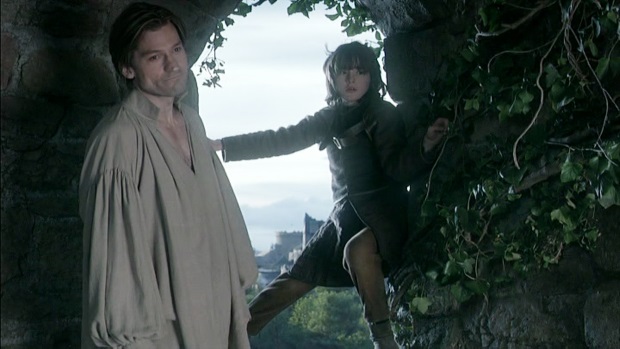
Other hindsight-ironies appear through more serious character growth. When Queen Cersei remarks of season one Sansa Stark that “there’s little of the North in her,” she’s right on the money. Until her father’s execution, season one Sansa is a pouty, selfish nitwit (or, you know, just 13). Six seasons of grief and abuse transform her into a resilient leader with a keen strategic mind. Sansa’s natural Stark wilfulness having been tempered by cruel experience, she emerges every inch a Northerner.
In fact, look very carefully when Grand Maester Pycelle warns Cersei about Sansa, “She’s a sweet thing now your grace, but in ten years, who knows what treason she might hatch?” and you can actually see the future Lady of Winterfell turn to the camera and wink.
Arya Stark’s character development is set out more transparently than her sister’s in season one. That’s when she makes the enemies she wants to kill, and the allies who’ll help her to kill them. She meets Yoren of the Night’s Watch, who annoys her by calling her ‘boy’. By the end of the season, boy ‘Arry’ becomes the first of many life-saving disguises for the young Stark. Jon gives her Needle and Needle gives her a first victim. Swordmaster Syrio Forel teaches her about the Braavosi Many Faced God she later serves in the House of Black and White. Forel also instructs Arya in the art of fighting blind and what it means to “truly see”.
The most telling exchange of Arya’s in season one though, is with Ned. When he tells his little daughter that one day she’ll marry a lord and have sons who are princes, she hops onto one leg, practicing with her sword and confidently tells him, “No, that’s not me.” She says the same words to direwolf Nymeria in season seven. Encountering her old pet on the road back to Winterfell, Arya asks the she-wolf to join her at their old home but then realises this wild creature doesn’t belong in a castle. “No, that’s not you,” says Arya, letting her go.
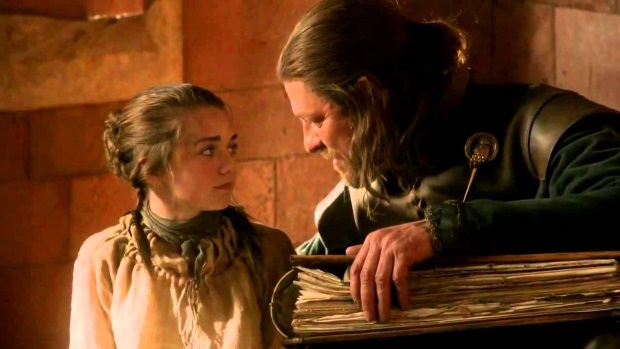
Samwell Tarly also doesn’t take long to show his true mettle. His season seven achievements are all presaged by early scenes. It’s Sam who says “only fire will stop them” of the Wights and White Walkers as far back as season one. How does Sam know that? He read about it in “a very old book.” Reading about things in very old books becomes Sam’s superpower. Very old books are where he discovers both the seam of Wight-destroying dragonglass underneath Dragonstone Castle, and—thanks to Gilly—Jon’s status as Rhaegar Targaryen’s true heir.
Bran, too, quickly reveals himself to be no ordinary little lord. No sooner does he lose the use of his legs than the Three-Eyed Raven starts to visit him in his dreams. Back in 2011, who could have foreseen that a bird with a stick-on peeper would turn the ten-year-old into a human search engine with the ability to drive people and animals by remote control? (Bran. He probably foresaw it).
More heartbreakingly, nobody was to know that little Bran’s psychic time-travel and warging powers would be responsible for his servant’s intellectual limitations. Watching the hefty sweetie carry the unwitting agent of his mental torture around Winterfell becomes more poignant with every “Hodor” from Hodor.
Hodor sacrificed himself for Bran, but that level of devotion is rare in the Seven Kingdoms. Betrayal is much more the order of the day. For every friendship built in season one, at least three mortal enemies are made. The makings of future enmity are all here. The Hound ends up on Arya’s kill-list after slicing up Mycah the butcher’s boy on Joffrey’s orders. Tyrion ends up on Joffrey’s shit-list after he slaps his nephew thrice in one of the internet’s most-played gifs. Jon Snow ends up on the end of Ser Alliser Thorne’s blade after they clash over Thorne’s cruel treatment of Sam in training…
Thorne’s mutiny against his Lord Commander came back to bite him, just like a whole host of seemingly by-the-by acts committed in season one. We saw Cersei having sex with her cousin Lancel and thought no more of it than ‘tsk, those freaky deaky Lannisters eh?’. After Lancel’s conversion to the Faith of the Seven though, his confession to their adultery and treason led to Cersei’s arrest and infamous walk of shame.
Another apparently insignificant season one move by Cersei returns to haunt her. When Joffrey takes the throne, Cersei removes Ser Barristan Selmy from his long-held position as head of the Kingsguard and gives the job to her twin brother Jaime. So what? So… Ser Barristan takes his decades of military experience across the Narrow Sea to serve Daenerys Targaryen and saves her from an assassination attempt. Had Selmy not been fired, Dany could have died in Slaver’s Bay and not sailed her army across the Narrow Sea, leaving Cersei’s bum sitting pretty on the Iron Throne.
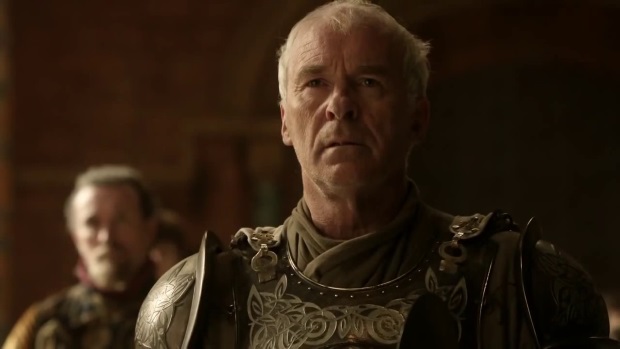
Catelyn Stark’s decisions prove no less calamitous than Cersei’s. By seizing Tyrion and putting him on trial for Bran’s attempted murder, Cat endangers Ned and her girls in the capital. By releasing Jaime Lannister from Robb’s capture, she lets him lay siege to her childhood home and kill her uncle. And by making a deal with Walder Frey reliant on Robb and Arya both marrying into the Frey family—something neither has any intention of doing—she makes an unscrupulous enemy that eventually leads to the slaughter of the Red Wedding.
It’s not the characters who get it wrong that make the most impact on a rewatch, it’s the ones who have it right from the start. It takes the Kings and Queens of the Seven Kingdoms years to realise what Osha the Wildling knows from day one. “He’s marching the wrong way,” she says sagely about Robb Stark taking his army to clash with the Lannisters. “All these swords should be going North, not South.”
Lord Commander Mormont too, is spot on with his season one verdict: “When dead men and worse come hunting for us in the night,” he asks his steward Jon Snow, “do you think it matters who sits on the Iron Throne?” Quite.
